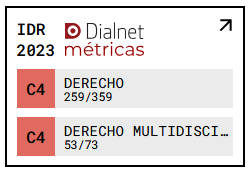Visions and professional experiences in the prevention of the institutionalization of persons with intellectual disabilities in La Rioja
DOI:
https://doi.org/10.18172/redur.4398Keywords:
Discapacidad intelectual, institucionalización, Grupos de Discusión, Trabajo SocialAbstract
A resource for take care and attention of people with intellectual disabilities is the institutionalization which includes includes people with support needs in an institution aimed at serving and responding to their needs. An element to prevent this trend and find other alternatives is to know the visions of family members and professionals who work directly with that group of people. This article offers these speeches, through the realization of two Discussion Groups. Among the main conclusions, practices that favour the maintenance of family relationships and that facilitate the establishment of social relationships with other people without disabilities in inclusive environments should be carried out. Residents must apply their self-determination in the day-to-day living, making decisions about their everyday matters.Downloads
References
HUETE GARCÍA, A., HUETE GARCÍA, M. Á., y MARTÍN GÓMEZ, Á. (2015). Institucionalización de las personas con discapacidad en España. Observatorio estatal de la discapacidad.
INSTITUTO DE MAYORES Y SERVICIOS SOCIALES, IMSERSO (2006). Institucionalización y dependencia.
INSTITUTO NACIONAL DE ESTADÍSTICA, INE (2008) Encuesta sobre Discapacidad, Autonomía personal y situaciones de Dependencia (EDAD 2008).
ORGANIZACIÓN MUNDIAL DE LA SALUD, OMS (2001). Clasificación Internacional del Funcionamiento, la Discapacidad y de la Salud (CIF). Ginebra, Organización Mundial de la Salud.
ORGANIZACIÓN NACIONES UNIDAS, ONU (2006). Convención Internacional sobre los Derechos de las Personas con Discapacidad, Protocolo Facultativo.
ORGANIZACIÓN NACIONES UNIDAS, ONU. Comité sobre los Derechos de las Personas con Discapacidad (2019). Observaciones finales sobre los informes periódicos segundo y tercero combinados de España del Comité sobre los Derechos de las Personas con Discapacidad (p. 14).
SCHALOCK, R.L. (2009). La nueva definición de discapacidad intelectual, apoyos individuales y resultados personales [The New Definition of Intellectual Disability, Individual Supports, and Personal Outcomes]. Siglo Cero, 229, pp. 22-39. Recuperado de: TAMARIT, J. (2015). “La transformación de los servicios hacia la calidad de vida. una iniciativa de innovación social de FEAPS”. Siglo Cero, 46 (3), pp. 47-71. https://doi.org/10.14201/scero20154634771. DOI: https://doi.org/10.14201/scero20154634771
VERDUGO, M.A. (2010). “Últimos avances en el enfoque y concepción de las personas con discapacidad intelectual”. Siglo Cero, 236, pp. 7-21.
VERDUGO, M. A., SCHALOCK, R. L., THOMPSON, J., y GUILLÉN, V. (2011). Discapacidad intelectual: definición, clasificación y sistemas de apoyo. Madrid, Alianza.
Downloads
Published
How to Cite
Issue
Section
License
Copyright (c) 2019 Ruth Morga Manzanares, Cecilia Serrano-Martínez

This work is licensed under a Creative Commons Attribution 4.0 International License.
The works published in REDUR are submitted to the following terms:
- The journal maintains the works published copyright, favours and allows the works reuse under a Creative Commons Attribution-NonComercial-NonDerivs 3.0 Unported license (legal text).
- Permissions beyond the scope of this license may be requested to Copyright Owners.
- Authors accept: the journal’s license of use; copyright policies and self- archiving; open access policy.
- In case of reuse published source must be acknowledged:
- Must include set publisher statement:
First published in Revista del Departamento de Dercho de la Universidad de La Rioja (REDUR) in [volume and number, or year], published by Universidad de La Rioja (Spain). - Set phrase to accompany link to published version:
The original publication is available at: www.unirioja.es/redur







